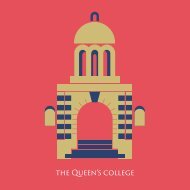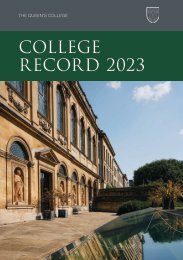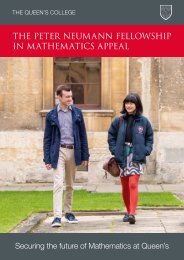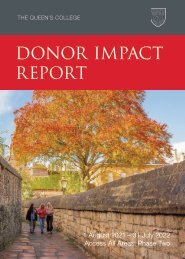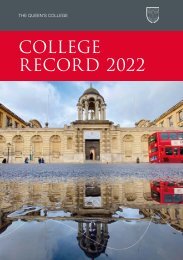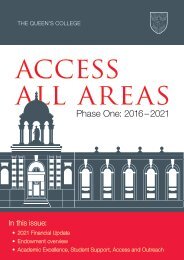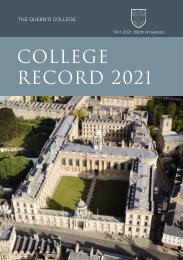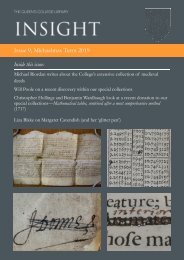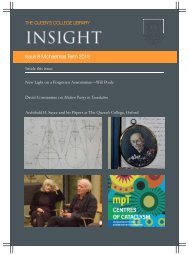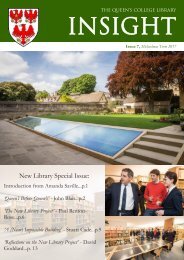The Queen's College Record 2020
You also want an ePaper? Increase the reach of your titles
YUMPU automatically turns print PDFs into web optimized ePapers that Google loves.
Obituaries<br />
Credit: Evgenia Eliseeva<br />
CLAYTON CHRISTENSEN<br />
Clayton M. Christensen, Harvard Business School’s<br />
(HBS) Kim B. Clark Professor of Business Administration,<br />
acclaimed author and teacher, and the world’s foremost<br />
authority on disruptive innovation, died on January 23,<br />
<strong>2020</strong>, surrounded by his loving family. Christensen was<br />
67 years old.<br />
Christensen joined the HBS faculty in 1992. He earned<br />
a BA with highest honors in Economics from Brigham<br />
Young University (1975); an MPhil in Applied Econometrics<br />
from Oxford University, where he studied at Queen’s as a Rhodes Scholar (1977); and an<br />
MBA with High Distinction (1979) and a DBA (1992) from Harvard Business School. He<br />
was granted tenure at the School in 1998 and named to a chaired professorship in 2001.<br />
‘Clayton Christensen was one of the world’s greatest scholars on innovation and a<br />
remarkable person who had a profound influence on his students and colleagues,’<br />
says Dean Nitin Nohria. ‘His research and writings transformed the way aspiring<br />
MBAs, industries, and companies look at management. He was a beloved professor<br />
and role model whose brilliant teaching and wisdom inspired generations of students<br />
and young academics. Most importantly, Clayton had a passion for helping others be<br />
their best selves that permeated every aspect of his life. His loss will be felt deeply by<br />
many in our community and his legacy will be long-lasting.’<br />
A gifted teacher across all of Harvard Business School’s educational programs,<br />
Christensen developed and taught for many years the MBA elective curriculum<br />
offering, Building and Sustaining a Successful Enterprise, which uses a general<br />
manager’s lens to evaluate theories about strategy, innovation, and management<br />
to predict which tools, strategies, and methods will be most effective. His Online<br />
course, Disruptive Strategy, has engaged more than 5,000 learners – more than 10%<br />
of Online’s cumulative learners to date. He also led doctoral seminars, served on a<br />
number of doctoral thesis committees, and was a member of the Doctoral Policy<br />
Committee. And he was a (highly sought-after) regular in a number of the School’s<br />
comprehensive leadership and focused Executive Education program offerings. In<br />
everything he did, Christensen sought to help his students understand the powerful<br />
way they could be a force for good in society and in the lives of others as managers —<br />
managers who energised and uplifted those around them.<br />
A distinguished scholar, Christensen was one of the most influential business<br />
theorists of the last 50 years, according to Forbes, and was twice ranked at the top<br />
of the Thinkers 50 list among many other awards and accolades. His research and<br />
ideas focus on identifying and managing factors that shape the way firms introduce<br />
advanced technologies to existing and prospective markets, and the process by<br />
which innovation transforms – or displaces – companies or entire industries. He first<br />
118 <strong>The</strong> Queen’s <strong>College</strong> | <strong>College</strong> <strong>Record</strong> <strong>2020</strong>




